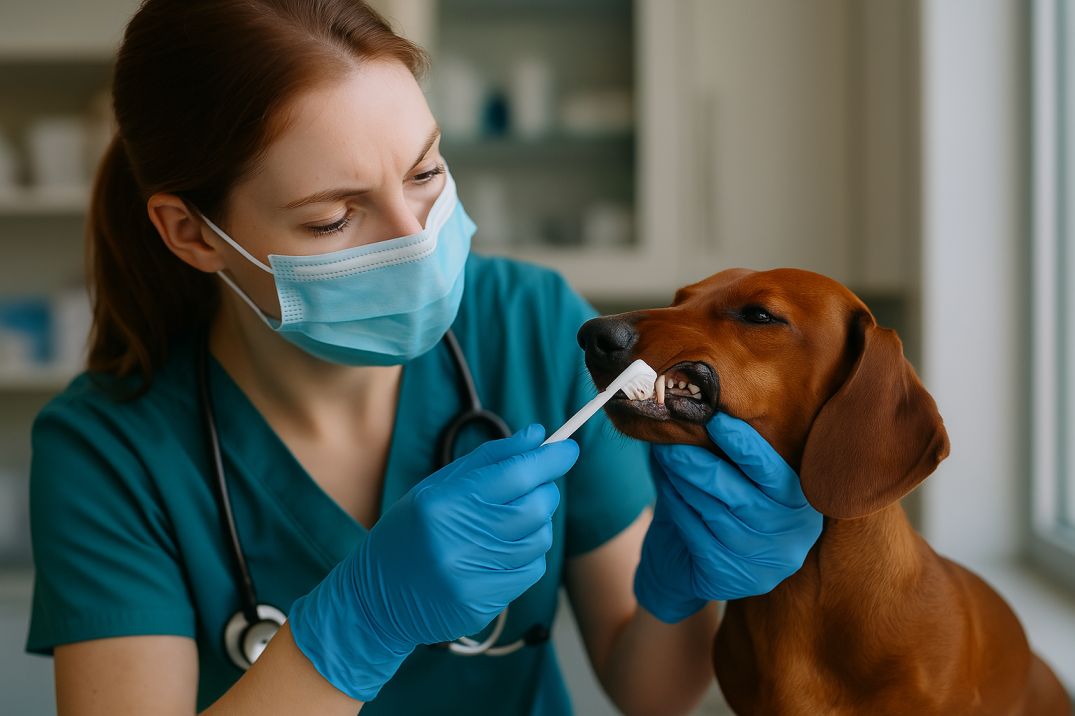Dachshunds are prone to many dental-related issues, which affect their teeth and gums. Their narrow jaws, diet, and genetics can contribute to a problem if not managed well. When they eat the food, the food piece gets stuck between their teeth. This can build harmful bacteria in their teeth, which can cause inflammation, and cause dental and gum diseases, which can reduce their appetite and change their behaviour. We all know how important dachshunds’ dental health is, and in this blog, I will guide you on dachshund dental care and share some tips to avoid dental diseases in them.
How to take care of their dental health
Regularly brush their teeth
Brushing is the most important action to keep them away from various teeth and gum-related issues. Dachshunds have a narrow and elongated jaw due to their unique head and skull shape. So they are prone to teeth and gum-related disease compared to other dog species.
Regular brushing helps to keep them away from these harmful dental diseases. Providing them at least 3-4 times a week brushing with a soft quality brush and dog toothpaste is important to keep their teeth and gums healthy.
Over time, tartar accumulates on your dog’s teeth. Regular brushing helps to reduce the amount, which primary cause of tartar buildup.
Give dental chews
If your dachshund struggles with brushing, dental chews can be an excellent alternative to help prevent harmful dental and gum diseases. Chewing helps remove soft plaque and prevent tartar buildup, especially in the spaces between teeth where food particles are trapped.
Chewing releases a significant amount of saliva inside the mouth, which lowers mouth acidity. This lowering in acidity is crucial for minimizing tartar buildup.
Remember to avoid using human toothpaste, which can be harmful for dogs, and use a certified canine toothpaste. You can also make a homemade toothpaste for your dog by using coconut oil, baking soda, and turmeric powder. Mix these ingredients and store in the fridge for further use.
Feed a dental-friendly diet
A dental-friendly diet for dogs is designed to reduce plaque, tartar buildup, and bad breath while supporting their oral health. This diet is especially designed for small dog breeds like dachshunds, which have a high chance of developing dental diseases because of their narrow jaw and crowded teeth. So, giving them a dental-friendly diet is most important for supporting their oral health.
Why is dental dental-friendly diet supportive of oral health
- Encourage more chewing than a normal diet
- Lower plaque and tartar buildup
- Support gum health
- Has an anti-inflammatory property that reduces inflammation in the gums
In the market, many dental-friendly diets are available that support our dogs’ oral health, like Dry Kibble (Hard Food). This feed promotes more chewing than other foods, which helps reduce tartar and plaque buildup.
You can also incorporate a raw diet that automatically cleans their teeth while chewing. You can include carrot, cucumber, and apple (without seeds) as part of their regular diet.
Dry Kibble (Hard Food): This feed promotes more chewing than other foods, which is helpful in reducing tartar and plaque buildup.
Provide chewing toys
Providing chewing toys is the best way to protect their oral health. This is best for various reasons.
Why do chew toys support their dental health
Remove tartar and plaque
Providing them a chewing toy automatically removes tartar and plaque when your dog chews a toy that rubs against the teeth; these physical actions scrape off soft plaque before it develops into harder tartar.
Strengthens the gums
When your dog chews, the physical action automatically massages the tissue of the gums, which increases blood flow in the gums and makes their gums healthier and stronger.
Reduce bad breath
Chewing helps in reducing the bad breath problem of your dog by promoting saliva production. Sliva neutralizes the mouth’s acid, which causes bad breath.
Regular vet checkups
Regular vet checkups are very crucial for your dog’s oral health. Dachshund teeth are very crowded; they need frequent checkups and cleanup. So we need to visit the vet regularly to keep them from these harmful dental diseases.
Signs and symptoms of dental issues in dachshunds
Dachshunds show various signs and symptoms if they have any teeth and gum issues; some most important are listed below
Bad breath
Bacteria living in the teeth release sulfur compounds after eating, which smell bad and cause bad breath.
Red, swollen, and bleeding gums
This is also most common symptoms we can see when our dog has a dental issue in the initial stage. After eating, food particles and saliva mix with bacteria to form plaque. If it doesn’t get removed by brushing, it hardens into tartar and causes inflammation.
Difficulty in eating and feeding
When your dog stops eating or does not have a normal appetite, it can be a sign of dental disease. Inflammation causes pain and loss of appetite.
Yellow or brown tartar buildup
When you see yellow and brown tartar between dogs’ teeth, you must understand it is a sign of dental diseases. Bacteria feed on food particles and release acid in your teeth, which can also degrade teeth over time.
Conclusion
Dachshund dental care is often overlooked by their owners, but it is crucial due to their susceptibility to various dental diseases caused by the narrow structure of their jaws, proper dental care is very important for several reasons, including maintaining a healthy appitite they lost their appitite when they feel discomfort because of the pain, keeping their dental health good helps protecting against serious heart and kidney diseases. Dental and gum-related issues are closely linked to heart and kidney diseases, so taking care of their oral health is essential. We can keep their oral health by incorporating simple practices into their routine, such as regular brushing, providing chewing toys, using a dentally friendly diet, and scheduling regular veterinary checkups.

